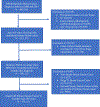Clinical and sociodemographic risk factors associated with the development of second primary cancers among postmenopausal breast cancer survivors
- PMID: 36316601
- PMCID: PMC9974531
- DOI: 10.1007/s12282-022-01411-8
Clinical and sociodemographic risk factors associated with the development of second primary cancers among postmenopausal breast cancer survivors
Abstract
Background: Advancement in breast cancer (BC) diagnosis and treatment have increased the number of long-term survivors. Consequently, primary BC survivors are at a greater risk of developing second primary cancers (SPCs). The risk factors for SPCs among BC survivors including sociodemographic characteristics, cancer treatment, comorbidities, and concurrent medications have not been comprehensively examined. The purpose of this study is to assess the incidence and clinicopathologic factors associated with risk of SPCs in BC survivors.
Methods: We analyzed 171, 311 women with early-stage primary BC diagnosed between January 2000 and December 2015 from the Medicare-linked Surveillance Epidemiology and End Results (SEER-Medicare) database. SPC was defined as any diagnosis of malignancy occurring within the study period and at least 6 months after primary BC diagnosis. Univariate analyses compared baseline characteristics between those who developed a SPC and those who did not. We evaluated the cause-specific hazard of developing a SPC in the presence of death as a competing risk.
Results: Of the study cohort, 21,510 (13%) of BC survivors developed a SPC and BC was the most common SPC type (28%). The median time to SPC was 44 months. Women who were white, older, and with fewer comorbidities were more likely to develop a SPC. While statins [hazard ratio (HR) 1.066 (1.023-1.110)] and anti-hypertensives [HR 1.569 (1.512-1.627)] increased the hazard of developing a SPC, aromatase inhibitor therapy [HR 0.620 (0.573-0.671)] and bisphosphonates [HR 0.905 (0.857-0.956)] were associated with a decreased hazard of developing any SPC, including non-breast SPCs.
Conclusion: Our study shows that specific clinical factors including type of cancer treatment, medications, and comorbidities are associated with increased risk of developing SPCs among older BC survivors. These results can increase patient and clinician awareness, target cancer screening among BC survivors, as well as developing risk-adapted management strategies.
Keywords: Aromatase inhibitor; Breast cancer survivors; Comorbidities; Medications; Second primary cancer.
© 2022. The Author(s), under exclusive licence to The Japanese Breast Cancer Society.
Conflict of interest statement
Figures
Similar articles
-
Radiotherapy and increased risk of second primary cancers in breast cancer survivors: An epidemiological and large cohort study.Breast. 2024 Dec;78:103824. doi: 10.1016/j.breast.2024.103824. Epub 2024 Oct 19. Breast. 2024. PMID: 39442313 Free PMC article.
-
Association of First Primary Cancer With Risk of Subsequent Primary Cancer Among Survivors of Adult-Onset Cancers in the United States.JAMA. 2020 Dec 22;324(24):2521-2535. doi: 10.1001/jama.2020.23130. JAMA. 2020. PMID: 33351041 Free PMC article.
-
Risk of Subsequent Primary Cancers Among Adult-Onset 5-Year Cancer Survivors in South Korea: Retrospective Cohort Study.JMIR Public Health Surveill. 2024 May 8;10:e48380. doi: 10.2196/48380. JMIR Public Health Surveill. 2024. PMID: 38717807 Free PMC article.
-
Risk of developing a second primary cancer in male breast cancer survivors: a systematic review and meta-analysis.Br J Cancer. 2022 Nov;127(9):1660-1669. doi: 10.1038/s41416-022-01940-1. Epub 2022 Sep 17. Br J Cancer. 2022. PMID: 36115878 Free PMC article.
-
Correlation between second and first primary cancer: systematic review and meta-analysis of 9 million cancer patients.Br J Surg. 2024 Jan 3;111(1):znad377. doi: 10.1093/bjs/znad377. Br J Surg. 2024. PMID: 38055899
Cited by
-
Association of Hypertension and Breast Cancer: Antihypertensive Drugs as an Effective Adjunctive in Breast Cancer Therapy.Cancer Manag Res. 2022 Apr 1;14:1323-1329. doi: 10.2147/CMAR.S350854. eCollection 2022. Cancer Manag Res. 2022. PMID: 35392356 Free PMC article.
-
Risk factors of breast cancer patients developing multiple primary cancers: a retrospective study and establishing/testing of machine learning models.BMC Med Inform Decis Mak. 2025 Jul 25;25(1):277. doi: 10.1186/s12911-025-03086-5. BMC Med Inform Decis Mak. 2025. PMID: 40713705 Free PMC article.
-
Advancements in Understanding the Hide-and-Seek Strategy of Hibernating Breast Cancer Cells and Their Implications in Oncology from a Broader Perspective: A Comprehensive Overview.Curr Issues Mol Biol. 2024 Aug 1;46(8):8340-8367. doi: 10.3390/cimb46080492. Curr Issues Mol Biol. 2024. PMID: 39194709 Free PMC article. Review.
References
MeSH terms
Grants and funding
LinkOut - more resources
Full Text Sources
Medical



